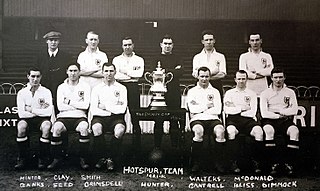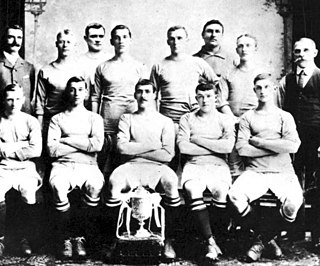The 1952–53 FA Cup was the 72nd season of the world's oldest football cup competition, the Football Association Challenge Cup, commonly known as the FA Cup. Blackpool won the competition for the first time, beating Bolton Wanderers 4–3 in the final at Wembley.
The 1994–95 FA Cup was the 114th staging of the FA Cup. The competition was won by Everton, with a shock victory over Manchester United, who were strong favourites to retain the title. This tournament was the 50th to be officially held since the six-year suspension due to World War II. Everton's Joe Royle would be the last English-born manager to lift the FA Cup until Harry Redknapp managed Portsmouth to the 2008 victory. As of 2023, this is the most recent major trophy won by Everton.
The 1982–83 FA Cup was the 102nd season of the world's oldest football knockout competition, The Football Association Challenge Cup, or FA Cup for short. The competition was won by Manchester United, who drew the first final 2–2, but won the replay 4–0.
The 1980–81 FA Cup was the 100th season of the world's oldest football knockout competition, The Football Association Challenge Cup, or FA Cup for short. The final saw Tottenham Hotspur defeat Manchester City in the first Wembley replay. The final saw a memorable solo goal from Ricky Villa that was voted the greatest goal scored at Wembley.

The 1894–95 FA Cup was the 24th season of the world's oldest association football competition, the Football Association Challenge Cup. The cup was won by Aston Villa, who defeated West Bromwich Albion 1–0 in the final of the competition, played at Crystal Palace in London. This was Villa's second victory in the FA Cup.
The 1975–76 FA Cup was the 95th staging of the world's oldest football knockout competition, The Football Association Challenge Cup, or FA Cup. The final saw 2nd tier Southampton beat Manchester United 1–0, with the only goal coming from Bobby Stokes in the 83rd minute of the game.
The 1934–35 FA Cup was the 60th season of the world's oldest football cup competition, the Football Association Challenge Cup, commonly known as the FA Cup. Sheffield Wednesday won the competition for the third time, beating West Bromwich Albion 4–2 in the final at Wembley, winning through two late goals from Ellis Rimmer.
The 1899–1900 FA Cup was the 29th staging of the world's oldest association football competition, the Football Association Challenge Cup, and the last to be held fully in the 19th century. The cup was won by Bury, who defeated Southampton 4–0 in the final of the competition, played at Crystal Palace in London.

The 1920–21 FA Cup was the 46th season of the world's oldest association football competition, the Football Association Challenge Cup. Tottenham Hotspur won the competition, beating Wolverhampton Wanderers 1–0 in the final at Stamford Bridge, London.
The 1904–05 FA Cup was the 34th season of the world's oldest association football competition, the Football Association Challenge Cup. Aston Villa won the competition for the fourth time, beating Newcastle United 2–0 in the final at Crystal Palace, through two goals scored by Harry Hampton. The man of the match was Aston Villa's prolific scorer Billy Garraty, who was born only a few miles from the now Villa Park.

The 1897–98 FA Cup was the 27th season of the world's oldest association football competition, the Football Association Challenge Cup. The cup was won by Nottingham Forest, who defeated Derby County 3–1 in the final of the competition, played at Crystal Palace in London.
The 1925–26 FA Cup was the 51st staging of the world's oldest football cup competition, the Football Association Challenge Cup, commonly known as the FA Cup. Bolton Wanderers won the competition for the second time, beating Manchester City 1–0 in the final at Wembley.
The 1907–08 FA Cup was the 37th staging of the world's oldest association football competition, the Football Association Challenge Cup. Wolverhampton Wanderers won the competition for the second time, beating Newcastle United 3–1 in the final at Crystal Palace.
The 1906–07 FA Cup was the 36th season of the world's oldest association football competition, the Football Association Challenge Cup. The Wednesday won the competition for the second time, beating holders Everton 2–1 in the final at Crystal Palace.

The 1903–04 FA Cup was the 33rd season of the world's oldest association football competition, the Football Association Challenge Cup. Manchester City won the competition for the first time, beating Bolton Wanderers 1–0 in the final at Crystal Palace, through a goal scored by Billy Meredith.
The 1902–03 FA Cup was the 32nd season of the world's oldest association football competition, the Football Association Challenge Cup. Bury won the competition for the second and final time, beating Derby County 6–0 in the final at Crystal Palace. This scoreline stood as a record victory in an FA Cup final until Manchester City equalled it by beating Watford 6–0 on 18 May 2019.
The 1901–02 FA Cup was the 31st staging of the world's oldest association football competition, the Football Association Challenge Cup. Sheffield United won the competition for the second time, beating Southampton 2–1 in the replay of the final at Crystal Palace. The first match had finished 1–1.
The 1900–01 FA Cup was the 30th season of the world's oldest association football competition, the Football Association Challenge Cup. The cup was won by Tottenham Hotspur of the Southern League, who defeated Sheffield United 3–1 in a replay after a 2–2 draw in the first game. This is the only occasion since the formation of The Football League in 1888 that a club from outside the League has won the cup.

The 1898–99 FA Cup was the 28th season of the world's oldest association football competition, the Football Association Challenge Cup. The cup was won by Sheffield United, who defeated Derby County 4–1 in the final of the competition, played at Crystal Palace in London.
The 1896–97 FA Cup was the 26th season of the world's oldest association football competition, the Football Association Challenge Cup. The cup was won by Aston Villa, who defeated Everton 3–2 in the final of the competition, played at Crystal Palace in London. In doing so, Aston Villa became only the second team to have won the Double, as they won the league on the same day as their cup victory.





